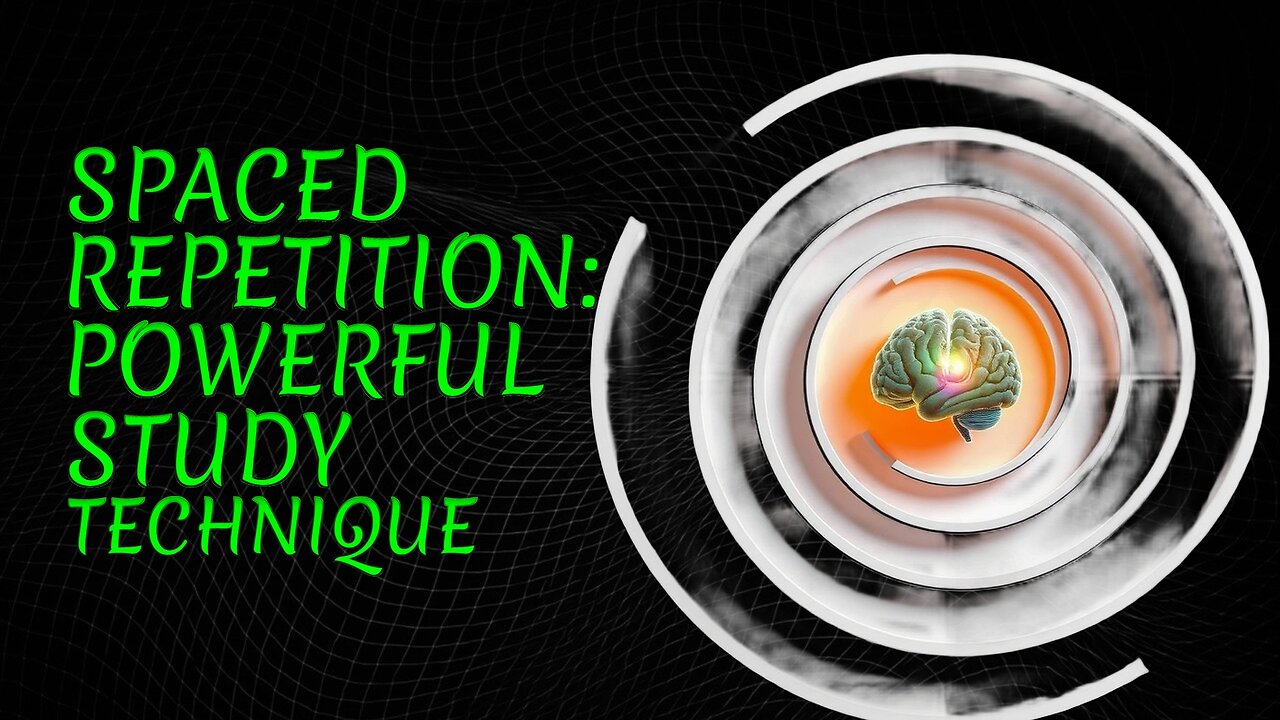Premium Only Content

Spaced Repetition: The most powerful study technique | Understanding Psychology
Title: Spaced Repetition: The most powerful study technique | Understanding Psychology
Description:
Spaced repetition is widely regarded as one of the most effective study techniques, grounded in the principles of cognitive psychology. This method involves reviewing information over increasing intervals of time, rather than cramming it all at once. By spacing out the repetition of the material, learners can significantly enhance their long-term retention and understanding.
The concept of spaced repetition is rooted in the Ebbinghaus Forgetting Curve, a hypothesis proposed by German psychologist Hermann Ebbinghaus. Ebbinghaus discovered that memory retention declines over time, but this decline can be mitigated by reviewing the material at strategic intervals. When information is revisited just before it is about to be forgotten, it reinforces neural pathways, making recall easier and more durable.
One of the key advantages of spaced repetition is its adaptability to various learning styles and subjects. Whether you are studying for an exam, learning a new language, or mastering a musical instrument, incorporating spaced repetition can yield substantial benefits. For example, flashcard systems like Leitner and software applications like Anki utilize spaced repetition algorithms to optimize learning efficiency. These tools present users with information at gradually increasing intervals, ensuring that the material is reviewed just before it is forgotten.
Moreover, spaced repetition is not just about rote memorization; it also enhances deeper understanding and conceptual learning. By revisiting information over time, learners have the opportunity to connect new knowledge with existing knowledge, fostering a more comprehensive grasp of the subject matter. This holistic approach not only improves memory but also strengthens critical thinking and problem-solving skills.
In practical terms, implementing spaced repetition can be as simple as creating a study schedule that spaces out review sessions. For instance, after initially learning new material, one might review it the next day, then again after a week, and subsequently at longer intervals. This structured approach helps combat the natural tendency to forget and ensures that the information remains fresh and accessible.
In conclusion, spaced repetition is a powerful study technique that leverages the principles of cognitive psychology to enhance learning and memory retention. By incorporating spaced repetition into study routines, learners can achieve better long-term retention, deeper understanding, and improved academic performance.
Tags:
spaced repetition, study techniques, cognitive psychology, Ebbinghaus Forgetting Curve, long-term retention, learning efficiency, flashcard systems, Anki, conceptual learning, study schedule
-
 LIVE
LIVE
Game On!
18 hours ago $2.36 earnedIt's A FOOTBALL Friday! NFL In Brazil! Chiefs vs Chargers Preview!
3,202 watching -
 LIVE
LIVE
JuicyJohns
30 minutes ago🟢#1 REBIRTH PLAYER 10.2+ KD🟢
78 watching -
 14:31
14:31
Adam Does Movies
13 hours ago $2.78 earnedAlien: Earth Episode 5 - Recrap
32.5K2 -
 12:54
12:54
Michael Button
18 hours ago $2.48 earnedWhat If We’re Just the Most Recent Civilization?
11.6K14 -
 1:15:19
1:15:19
Surviving The Survivor: #BestGuests in True Crime
2 days agoDonna Adelson's Defense Witnesses Get Caught Up on Stand; Will Jurors Believe Them?
2.55K -
 LIVE
LIVE
The Bubba Army
23 hours agoTyson vs Mayweather SUPERFIGHT! - Bubba the Love Sponge® Show | 9/05/25
1,997 watching -
 25:26
25:26
World2Briggs
19 hours ago $0.90 earnedTop 15 Most Visited Cities in the World
10.9K1 -

BEK TV
1 day agoTrent Loos in the Morning - 9/05/2025
10.4K -
 LIVE
LIVE
FyrBorne
3 hours ago🔴Warzone M&K Sniping: This May Be The Most Broken Update Yet
59 watching -
 10:59
10:59
Degenerate Jay
17 hours ago $1.71 earned007 First Light Is The James Bond Game Fans Deserve
25.3K2